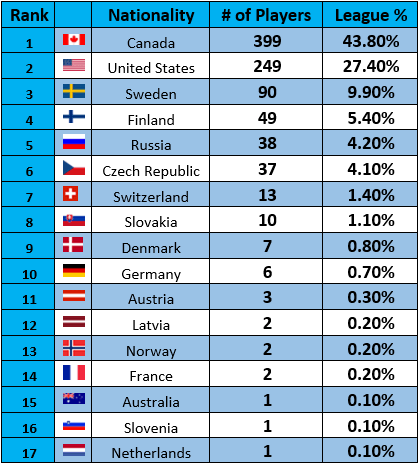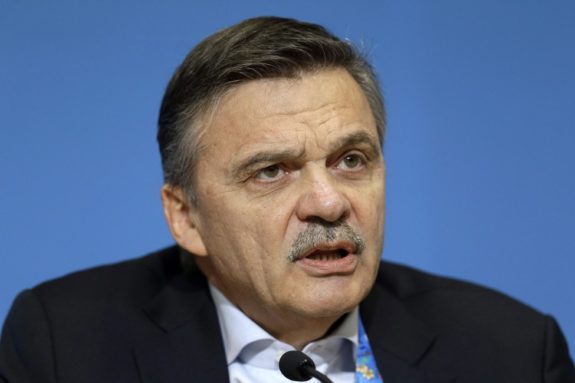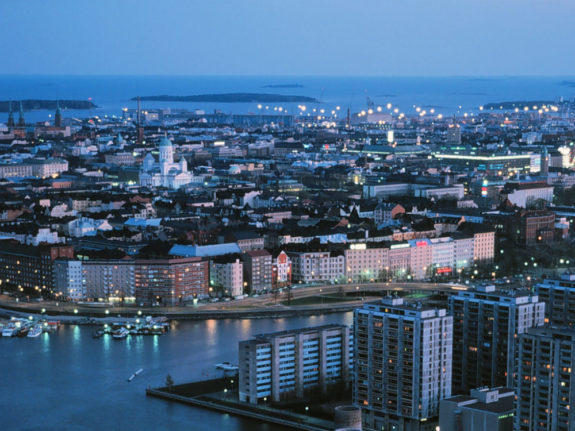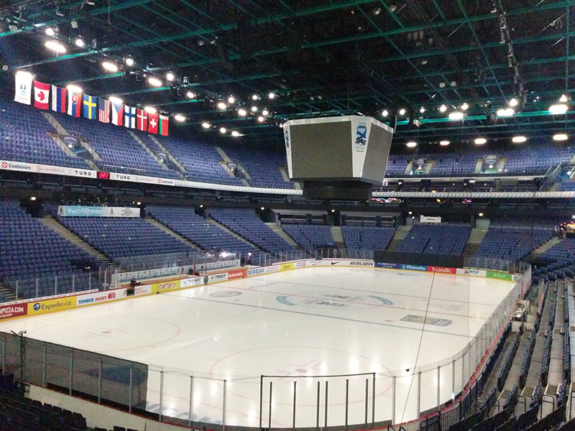In 2008, NHL Deputy Commissioner Bill Daly publicly acknowledged optimism that the NHL would have a permanent presence in Europe within the next 10 years. However, he suggested that the barriers to the NHL’s entry into Europe would be significant. He stated, “Those barriers include excessive travel, competition from established leagues, revenue generation and laws that conflict with the NHL’s Collective Bargaining Agreement (CBA). Here we are 10 years later with no concrete strategy in place for future NHL expansion to Europe.

On the other hand, the NHL has taken the initiative to expand its brand and contribute to the growth of the game overseas. Over each of the last two seasons, the league has played two preseason games, marketed as the NHL China Games, in Shanghai, Beijing and Shenzhen, China. Last season, the Colorado Avalanche and Ottawa Senators played two regular-season games in Stockholm, Sweden in front of sellout crowds.
This season, the Edmonton Oilers and New Jersey Devils played exhibition games in October against local professional teams in Cologne, Germany and Bern, Switzerland, respectively. They then faced each other for their regular-season opener in Gothenburg, Sweden. On Nov. 1 – 2, the Florida Panthers and Winnipeg Jets faced off in Helsinki, Finland for a pair of regular season games.
The motivation to expand overseas has improved with the increase in the number of European players competing in the NHL. As of Jan. 29, 2019 there were a total of 262 Non-North American players from 15 different countries playing in the league or 28.8 percent of the NHL total of 910 players. Sweden tops the overseas list with 90 players (9.9 percent), while Finland can boast 49 players or 5.4 percent of the total.

The concept of the “globalization” of the National Hockey League by expanding to overseas markets will face many challenges as expressed by Daley. For example, travel will be challenging and costly given the fact that west coast NHL franchises could conceivably be as far away as nine time zones away from an eastern European team. A potential benefit would be access to new revenue sources, like European broadcast rights, that would contribute significantly to overall league profitability.
Challenges to NHL European Expansion
Sustainability for NHL European franchises could be an issue. Rene Fasel, president of the International Ice Hockey Federation (IIHF), has indicated that he is opposed to this proposed expansion as he feels it poses a threat to European professional hockey teams. NHL experts are concerned that the arenas in Europe are not adequate to support an NHL franchise.
According to David Shoalts, “The largest hockey arenas in Europe are Lanxess Arena in Cologne, which seats 18,500 for hockey, O2 Arena in Prague, with a capacity of 17,383, and PostFinance-Arena in Bern (17,131). Other hockey arenas in major European cities seat 15,000 or less. There will never be enough arenas in European cities with the seating capacity and luxury suites to generate enough revenue to support NHL teams.”

Brian Burke, the former Director of Hockey Operations for the Calgary Flames, stated “I don’t think it’s imminent, because buildings in Europe don’t generate NHL economics. Until you have buildings that can match or exceed NHL economics, why would you play there? But I think it will happen.” He also expressed a concern that Europeans would not want to pay NHL ticket prices. However, he felt that the NHL “…could cover that loss at the gate with television revenue.” (from ‘Travel, economic issues surface at NHL, NFL European expansion panel’, _The Globe & Mail_ – 3/22/18).
NHL teams in Europe will take on additional currency risk with the Euro Dollar added to the Canadian and US dollars as part of league revenues. The fact that NHL players are paid in US dollars would be a concern. The current exchange rate for one US dollar is 0.87 Euros, so the cost of living will increase for the players and their families, not to mention the overall cost of living is higher in most European countries compared to North America. Teams will also be forced to contend with different accounting practices and labor laws that may not accept some terms of the CBA.

Ethical issues would be high on the list of concerns for franchises forced to relocate overseas. Uprooting families to new distant locations, language, and cultural barriers and different school systems would be concerns for players, staff and their families. Management would need to make tough decisions regarding office staff hires. Do you move existing staff, or train locals that understand the culture and language in the marketplace? Management would be challenged to incorporate home-country ethical standards with host-country ethical standards effectively.
North American teams that are forced to relocate will create financial hardship for long-term stakeholders such as arena employees and suppliers, and advertising and sponsorship companies would lose marketing opportunities, resulting in lost revenues. A reduction in tourist revenues would be a symptom of the relocation, impacting local hotels, restaurants, bars and travel companies. The identity of the city that has lost the franchise would be negatively affected, as professional sports franchises invoke a local sense of pride and belonging among fans and all stakeholders that depend on the team’s operations.
Benefits to the NHL & Struggling Teams
The benefits of league expansion to Europe are compelling. Relocating existing teams could be an opportunity to breathe new life into franchises that are struggling in North America. The league could sign new, lucrative broadcast rights with European companies and develop new relationships with European advertisers and sponsors. Newly created arena, concession, and support staff positions at the games would contribute to local economies.
Economic activity would improve with capital investment in new arenas, increased spending at hotels, restaurants and bars and the creation of an additional source of taxes. Ultimately, the game of hockey overseas would benefit with more engagement at the grassroots level, and loyal NHL fans in Europe will finally be able to see their favorite players perform live.

Adjustments could be made to overcome the many hurdles that stand in the way of NHL expansion to Europe. NHL owners could agree to a new scheduling format making increased travel mileage and expenses less onerous. Additionally, whereas NHL teams in Europe would be unlikely to thrive if they sell tickets at North American prices, they can set prices established by the hockey market in their countries.
Revenue shortfalls could be reduced by building European sponsorship relationships, signing new lucrative broadcast rights deals and encouraging large European corporations to invest capital resources for the construction of new NHL size arenas. Global sponsors like Adidas, SAP and China-based O.R.G. that are critical partners with the NHL would have new hockey markets to promote their brands.
We might even see a stronger relationship between the NHL and the IIHF as a result of NHL expansion initiatives, making Olympic participation for NHL players something that hockey fans in North America, Europe, and Asia can look forward to every four years.